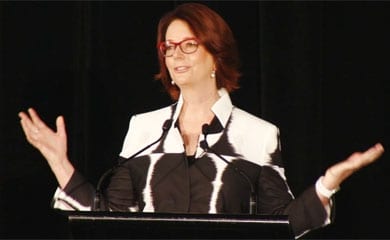
Former Prime Minister Julia Gillard is possibly the single best woman in the country to give advice on leadership.
She’s seen it all. From being popular, to disliked, to being the subject of sexism and misogyny, to negotiating a minority government and successfully pushing through some significant change.
And so she was a fitting choice for Layne Beachley to appoint her patron of Aim for the Stars, an organisation that supports girls and women in achieving their ambitions.
Last month, Gillard spoke at a sold-out lunch to raise money for Aim For the Stars, where she shared her vital lessons on leadership.
And they were very, very good lessons.
Indeed, she even went so far as to disclose the “single best piece of advice” she received during her political career. That came from a former minister in the Tony Blair Government, who urged her to sit down with a piece of paper and write down exactly what she hoped her time in government would achieve.
She also shared a regret from her time in office: that she didn’t carve out enough time for “thinking alone, or with the best and brightest around me.” Too often the urgent gets in the way of the important, she said, but we need to find that solid thinking time to think through the things that will matter tomorrow.
Below are Julia Gillard’s four essentials of leadership.
1. Hone your sense of purpose
Everybody wants to talk about the ‘narrative’, said Gillard. Indeed, her government was often accused of lacking a narrative, and corporate boardrooms can get stumped on just what their narrative should be.
But all this searching for a narrative is really about coming up with a slogan. While slogans have a place, it’s only through honing your sense of purpose that you can come up with something much deeper.
Gillard said that she made the time to sit down with a sheet of paper and write down what her purpose in politics would be. It was a document she kept with her, and pulled out to go over during the tough days.
Don’t just think about it [your purpose], actually put yourself through the exercise. You will find it’s a hard one but please do it, sit with a piece of paper and write it out. What is your vision? What are your values? What are you striving to achieve?
2. Nurture a very strong sense of self
We all want to be liked, but that’s not always possible in leadership.
Gillard said that part of what helped her survive the most turbulent times of her politic career stemmed from the fact she always kept a natural sense of self about who she is.
I’ve never defined myself through approval coming from the eyes of others.
While not every job is as open to as much criticism as the role of prime minister, Gillard said she suspects most women both directly and on social media can often find themselves the target of not very friendly assessments.
Staying on course in all of that requires a clear sense of self. It also requires the ability to separate fair and constructive criticism from ugly sniping.
3. Find the discipline to think through the important
There is considerable tension between getting the urgent done, and finding time for the important.
Unfortunately, technology can hinder rather than help. Technology allows the urgent to continually “beep and ping” at us, at all hours of the day.
As such, Gillard believes making time for silence is more important than ever before.
In this crowded, contested world, having the discipline to carve out the time to do the important things has never mattered more and never been harder to attain. I urge you to find that discipline.
4. No one gets there alone
No matter how resilient and tough we think we are, we all need great supporters around us.
Gillard said she had unflinching moral support from the women around her including her mother, sister, friends and mentors like the late Joan Kirner.
She added she was also inspired by her father and his belief in the power of government to change lives for the better, and that she kept her grounding while in the top job with the help of her partner Tim, family and colleagues.
“You’ve got to surround yourself with people who support and care for you, and you’ve got to remember to make the time to support and care for them in return.”
Enable children. Enable women.
Two things enabled Gillard to thrive in leadership: the fact she had a great public education in South Australia, and that she never experienced gender discrimination in the early stages of her career (although it certainly came up later).
As such, Gillard urged the audience to consider how we can ensure girls all over the world have access to quality education, as well as what we do to eliminate some of the stereotypes and assumptions that still drive our perceptions of gender.
On the latter, Gillard’s particularly concerned about the notion that “men lead and women nurture”, a stereotype that can make female leaders seem unlikeable.
Finally, Gillard noted the struggles that still face women in Australia. They include the struggle to get more women into leadership, to achieve truly equal pay, to create more family-friendly workplaces and to see women live free from the threat of violence.
But around the world, such struggles are more basic, said Gillard. They include the fight for education, to choose who to marry and to live without horrific, gender-based violence.
As we fight for gender equality here at home, we also have to fight for gender equality around the world.
While I don’t underestimate any of the challenges and difficulties that are present in today’s world, I’m a huge optimist about the future.


